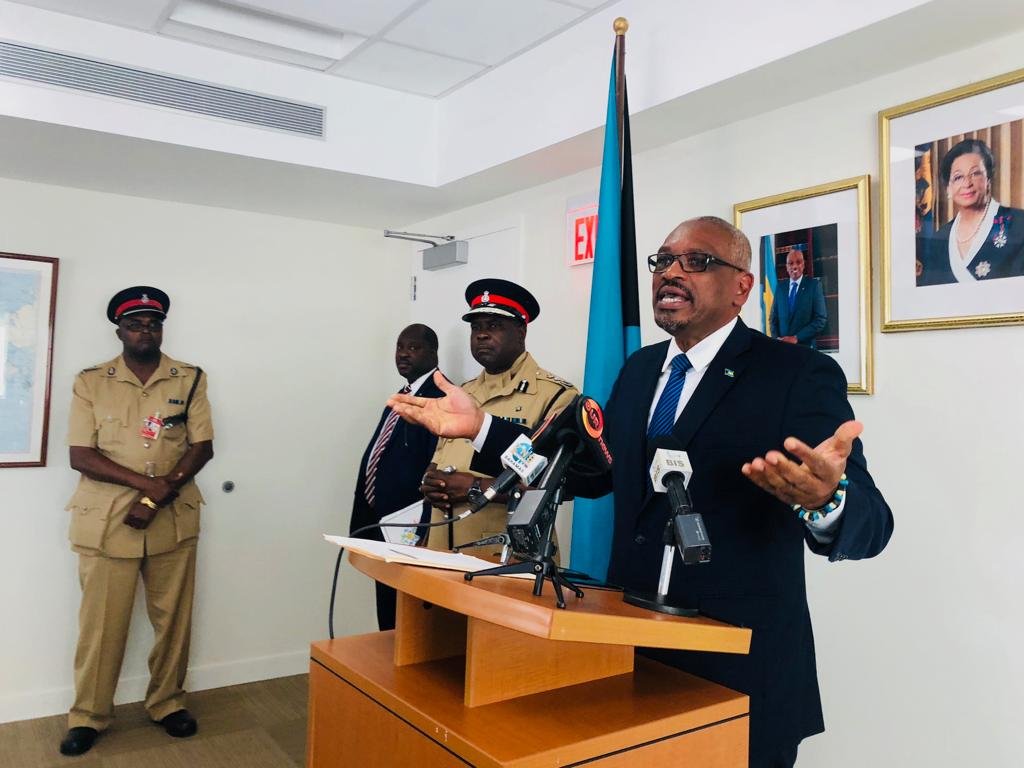Prime Minister, Dr. Hubert A. Minnis in his National Statement to the United Nations General Assembly in New York City, on Friday, called on the UN to intensify its commitment to addressing Climate Change, which is posing a real threat to Small Island Developing States such as The Bahamas.
Fresh from his delivery of the statement, and upon arrival home in Nassau on Saturday, he addressed a press conference at LPIA during which his remarks reflected the same concern put forward at the UN.
Prime Minister Minnis said to the United Nations, September 28, 2018 that The Bahamas is, in fact, faced with three ‘hurricanes’ namely: “Climate Change, OECD Blacklisting, and Migration” all of which place burdens on the nation.
He stated: “As nations, we must intensify our deliberations and commitment to addressing Climate Change. Climate change is a clear and present danger to us all, but in particular to low-lying coastal nations like The Bahamas.”
Climate Change can be seen in rising sea levels, the loss of coral reefs, the increased volume of acid in the oceans, and more severe and frequent hurricanes and typhoons, the Prime Minister said.
He also pointed out that this time last year, The Bahamas, many countries of the Caribbean, and parts of the United States of America, faced the onslaught of Category 4 or higher hurricanes.
“As Hurricane Irma hurled towards The Bahamas, my government took the difficult decision to evacuate residents from southern islands, to prevent the loss of lives and injury.
“Gratefully, we escaped without loss of life; but our southern neighbours were not as fortunate,” he said.
In this vein, the Prime Minister said he fully supports UN Secretary General Antonio Guterres’ plan to call a Climate Summit next September to mobilize action and financial support. As part of such discussions, he said, considerably more energy and resources need to be dedicated in building the resilience and sustainability of islands and coastal nations.
“Like our neighbours, The Bahamas is trying to rebuild our islands. However, the consecutive damage of major hurricanes has made this very difficult,” the Prime Minister, said.
As an archipelago, with many islands stretching approximately 600 miles from north to south, he stated that The Bahamas is required to replicate infrastructure many times over, with already limited resources. And, while the delivery of humanitarian aid is essential, it is equally important to focus on prevention, and the strengthening of capacity building, he said.
“Such an approach must be grounded in a comprehensive approach to sustainable development that addresses, in an integrated manner, the range of issues that are critical to The Bahamas — from disaster risk reduction to the sustainable use of the world’s seas and oceans to ensure their viability for generations to come.”
The Prime Minister also participated in the Bloomberg Roundtable on Building Resilient Economies and Preserving Marine Ecosystems in Coastal Commonwealth Nations. While commending such dialogue, he stressed that The Bahamas and its neighbours are being beaten twice, for circumstances not of their own making.
“It is not our island nations that are primarily responsible for the climate change which results in the scourges of hurricanes and other natural disasters.
“However, when we respond to national need by borrowing internationally, to seek to restore basic human infrastructure, our debt to GDP ratio rises, risking the possibility of a rating downgrade,” the Prime Minister said.
He further explained that this limits The Bahamas’ ability to provide for its citizens, being burdened with a price tag too heavy to be borne.
“Furthermore, the adverse impact of global financial inequity is seen in the use of the distorted matrix of GDP per capita as a measurement of national wealth and viability,” he said. This is done without due regard to a country’s vulnerabilities and the weight that should be given to localized circumstances, the Prime Minister said
“We remain concerned and disappointed that the application of this matrix causes The Bahamas to be assessed more favourably than it should be for contributions to international organizations, and for the receipt of grants, and international assistance when disaster strikes.
“The UN must bring greater focus and action in response to this inequitable issue,” the Prime Minister said.
The theme for this 73rd UN Session was: “Making the United Nations relevant to all people — global leadership and shared responsibilities for peaceful, equitable and sustainable societies.”
__
This article was written by LINDSAY THOMPSON, Bahamas Information Services.






